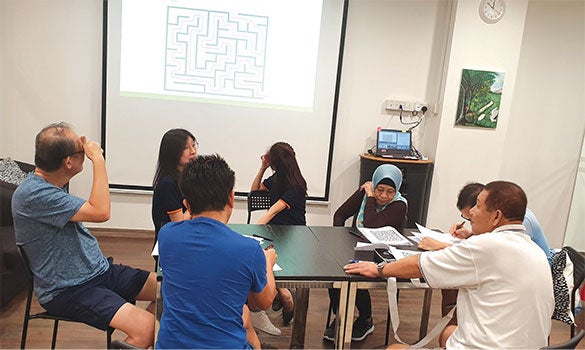
SMaRT programme participants taking part in cognitive exercises.
STROKE MEMORY REHABILITATION (SMART) PROGRAMME
The Temasek Foundation-National Neuroscience Institute Stroke Memory Rehabilitation (SMaRT) Programme is a three-year collaborative project which aims to provide a comprehensive preventive treatment regime for post-stroke patients to prevent cognitive decline.
SMaRT is a structured rehabilitation programme to help post-stroke patients improve aspects of cognition like memory, attention and executive function.
The programme caters to stroke patients (within the first year of suffering a stroke) with mild physical impairments but significant cognitive impairments.
Participants will take part in educational talks and handson activities. The programme covers commonly affected cognitive domains such as memory, attention and executive function (complex planning, higher thought process and execution of these tasks).
Cognitive decline may continue post stroke, though 16 to 20% of patients will improve in their cognition. While most improvements occur in the first three months, it is optimal for rehabilitation to continue for at least one year after the stroke.
Studies have shown that effective cognitive rehabilitation approaches have been reported for neurological deficits such as neglect and aphasia, hence the SMaRT Programme seeks to improve cognitive outcomes for better management of PSCI.
Dementia in Stroke Patients
Stroke is currently the second largest cause of acquired cognitive decline globally. Singapore experiences one of the world’s highest rates of stroke, with more than 7,000 new stroke patients each year. Currently, data from NNI demonstrates that 37.3% of patients develop post-stroke cognitive impairment (PSCI) within six months post stroke1. The global incidence of PSCI in stroke patients is reported to range from 20 to 40%.
PSCI patients being in the mild cognitive impairment stage, may present with a lesser degree of impairment in global cognition, mental flexibility, problem solving, attention, long-term memory, information processing speed, language, and navigation ability.
However, if left untreated or undiagnosed, these impairments can affect the quality of life, mental health and employability with deteriorating cognition. This is also likely to increase the chances of institutionalisation and contributes to a higher mortality rate.
As a growing public health burden, care options for PSCI are limited both in Singapore and worldwide as PSCI is under recognised and as a result undertreated. Current stroke rehabilitation programmes emphasise mainly on physical and functional rehabilitation but not cognition.
ENROLMENT CRITERIA
To join the programme, participants should :
- Be between 18-80 years old
- Have had a stroke not more than 12 months ago
- Have been experiencing poor memory three to 12 months after their last stroke
- Not have prior memory complaints or diagnosis of dementia made by any doctor
- Not have any prior diagnosed psychiatric conditions
- Have made significant physical recovery with minimal physical disability or none
PROGRAMME STRUCTURE
Over 8 weeks, participants will be empowered and engaged with activities focusing on :
1. Brain Essentials: Staying healthy promotes both cognitive and general wellbeing. Participants will learn about eating well, activities to keep the body and mind fit, sleep and stress management to enhance emotional well-being.
2. Exercise: Low to medium impact exercises that can be done daily to keep fit.
3. Core Cognitive Rehabilitation Component: Memory, attention, executive function and visual spatial rehabilitation.
4. Emotional Well-Being: Stress management and relaxation techniques.
There will be an assessment before each run of the programme and on the last day of the programme to monitor progression. Upon completion of the programme, there will be a review of the patient again on the third and sixth month.
To find out more about the programme, contact the National Neuroscience Institute (NNI) at 6357 7153 or enquiry@nni.com.sg.
REFERENCES
1. Kandiah N, Chander R, Lin X, Ng A, Poh YY, Cheong CY, Cenina AR, Assam PN. Cognitive Impairment after Mild Stroke: Development and Validation of the SIGNAL2 Risk Score. Alzheimers Dis. 2016;49(4):1169-77













 Get it on Google Play
Get it on Google Play